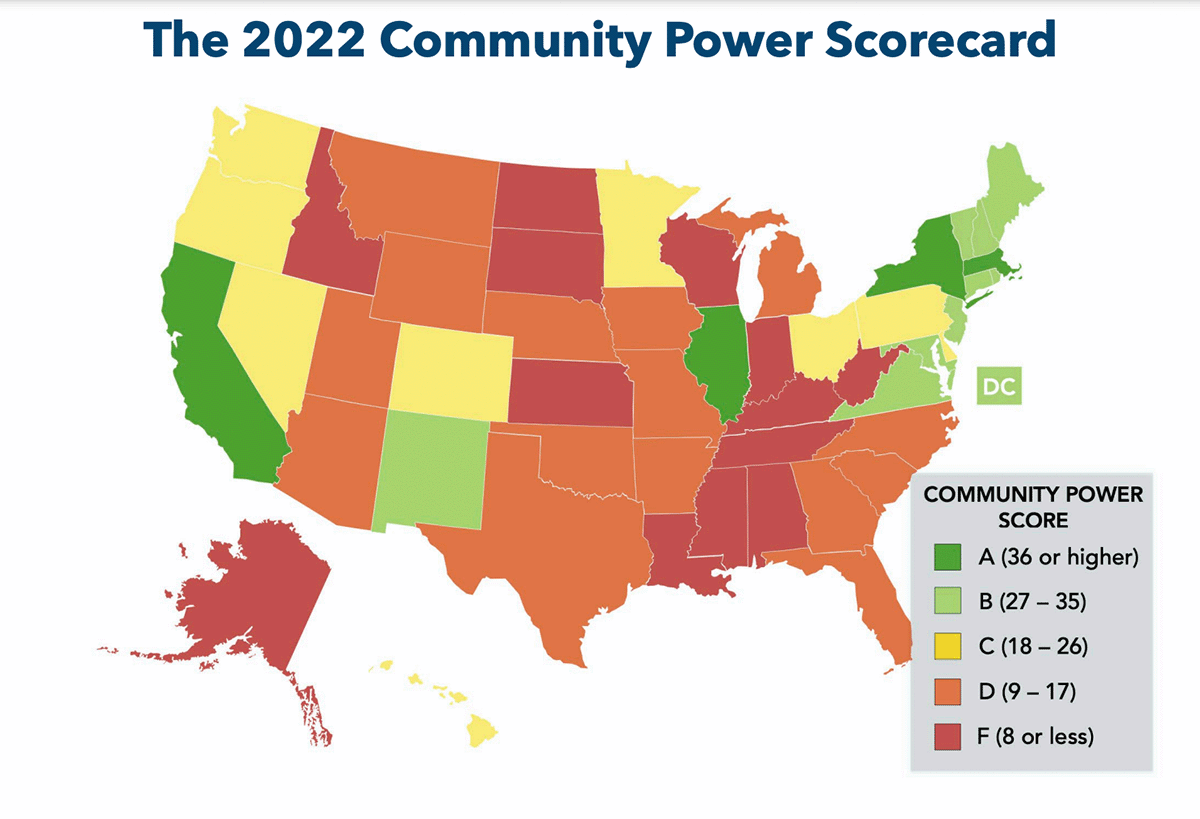The Institute for Local Self Reliance (ISLR) released its 2022 Community Power Scorecard, the fifth annual ranking of state energy policies that support local energy development, customer choice and distributed renewable energy. This year, the top-ranking states continue to be California, Massachusetts, New York and Illinois.
Tied for the top spot, California and Massachusetts have policies that strongly support community solar, solar/storage mandates, third-party financing and net metering, among others.

The ISLR Scorecard recognizes legal initiatives that will help transform the power sector and develop energy resources that are more decentralized, distributed and produced by local communities. Specifically, ISLR gives high scores to states that have implemented policies that support or allow:
• Interconnection rules that facilitate the addition of distributed renewable energy to the grid
• Fair valuation of distributed renewable energy through net metering
• Requirements for utilities to include renewables in their procurement plans
• Shared (community) renewable energy
• Property assessed clean energy (PACE) financing for commercial and residential projects
• Communities to pick their energy suppliers (community choice energy)
• Standard contracts for feed-in tariffs or distributed energy resources
• Third-party solar ownership (through leasing or Power Purchase Agreements (PPAs)
• Cities to implement building codes that are stricter than those of the state
• Cities to negotiate their own utility franchise contracts and fees (recently added category)
• Cities to choose whether or not to connect new buildings to natural gas infrastructure (recently added category)
Since ISLR implemented the Community Power Scorecard in 2017, many states across the U.S. have improved their standing by implementing new policies friendly to distributed renewable energy. Last year, states passed 30 policies that affected their 2022 Community Power scores. In many instances, the new policies boosted the state’s rankings, according to ILSR. However, state policies prevented local communities from banning natural gas infrastructure in new buildings in some cases. This year the ILSR began docking two points for states that continue to require cities to depend on fossil fuel.
Four states that provided the least support to clean local energy in 2022 include Louisiana, Kentucky, Idaho and South Dakota.
Supportive state policies yield progress on microgrids for resiliency
States with policies that support distributed energy development also tend favor microgrids. In Massachusetts, the state’s Municipal Vulnerability Preparedness (MVP) program requires participating towns and cities to evaluate their vulnerability to climate change and provides support to improve their resiliency.
Preparing for extreme weather events can include resiliency plans that feature microgrids. Yarmouth, Mass., a Cape Cod town, recently qualified for an MVP grant to develop an energy-resiliency strategy. The primary goal was to provide power to its mission-critical municipal operations, particularly for scenarios where the power grid goes down for prolonged periods. Rivermoor Energy, a national company headquartered in Boston and a state-certified provider under the MVP program, was selected by the Town of Yarmouth to develop a microgrid plan to accomplish the project’s goals.
Software modeling helps size and optimize assets
After being retained by project developer Rivermoor Energy, UL collaborated with Rivermoor Energy and their engineering partner Weston & Samson to model the microgrid using HOMER Grid modeling software. The models enabled the team to size and optimize the assets for a microgrid design that would provide resilience, energy cost-cutting and sustainability.
“HOMER Grid software is powerful enough to calculate a wide variety of incentives and help project developers predict performance and costs. That includes utilities that are under increasing pressure to develop clean energy projects,” said UL Renewables HOMER Grid Lead Eduardo Guerra.
Read the full story: Massachusetts Town Plans a Microgrid as the State’s First Clean Energy Resilience Solution.

UL Solutions HOMER Grid is a market-leading solar-plus-storage software tool for designing grid-tied distributed energy systems. With an integrated utility tariff database and a new module for electric vehicle charging stations, it optimizes peak shaving to help commercial and industrial utility customers lower their demand charges. HOMER Grid can model projects with wind and combined heat and power as well as islanded systems, helping users improve their resiliency. Explore your opportunities with HOMER Grid during a complimentary trial. Learn more and download your complimentary trial.
